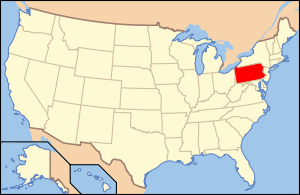Brownsville Commercial Historic District
|
Brownsville Commercial Historic District |
|
|
|
|
 |
|
Brownsville Commercial Historic District, May 2008 |
|
|
| Location |
105-128 Brownsville Ave. and 1-145 Market, 101-200 High, 2-6 Water, 100 Charles, 1 Seneca and 108 Bank Sts., Brownsville, Pennsylvania |
|---|
| Coordinates |
40°01′17″N 79°53′13″W / 40.02139°N 79.88694°W / 40.02139; -79.88694Coordinates: 40°01′17″N 79°53′13″W / 40.02139°N 79.88694°W / 40.02139; -79.88694 |
|---|
| Area |
19 acres (7.7 ha) |
|---|
| Architectural style |
Classical Revival, Moderne, Italianate |
|---|
| Governing body |
Federal |
|---|
| NRHP Reference # |
93000716[1] |
|---|
| Added to NRHP |
August 2, 1993 |
|---|
Brownsville Commercial Historic District is a national historic district located adjacent to the Brownsville Northside Historic District at Brownsville, Fayette County, Pennsylvania. The district includes 55 contributing buildings and 2 contributing structures in the central business district of Brownsville. Most of the contributing buildings are three and four-story brick commercial buildings built between 1900 and 1930, with four buildings dated to the 19th century. The oldest building is the Flatiron Building (c. 1835). Other notable buildings include the International Order of Odd Fellows Building (1876), Monongahela National Bank (1902), Second National Bank (1916), Snowden Building (1907), Union Station (1928), Plaza Theater (1920), Crawford Building (1908), and Borough Building (1940). The contributing structures are the separately listed Dunlap's Creek Bridge and a stone railroad tunnel (1903).[2]
It was added to the National Register of Historic Places in 1993.[1]
References
|
|---|
| | Topics | | |
|---|
| | Lists by county | |
|---|
| | Lists by city | |
|---|
| | Other lists | |
|---|
|
-
 Category Category
-
 NRHP portal NRHP portal
|
|
|
|---|
| |  Map of the Pittsburgh Tri-State with green counties in the metropolitan area and yellow counties in the combined area. | | | | | Communities |
|---|
| Municipalities 15,000–50,000 population
(in 2010) | |
|---|
|
| | | | | | |
|


